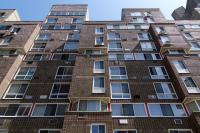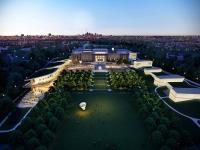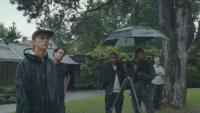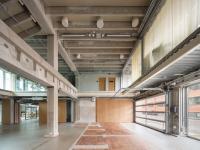Pears Jewish Campus
Berlin, Germany
The Blue House
Adjacent to the site of the Chabad Lubavitch Family and Cultural Centre in Berlin's Charlottenburg-Wilmersdorf district, the community centre Pears Jewish Campus Berlin is a facility for children and young people consisting of a school, a crèche, and a kindergarten.
Surrounded by heterogeneous architecture, the new school building with its organically curved form is a free-standing structure embedded in a green school garden with diverse open spaces for different uses, such as playgrounds and sports fields. The two-storey multi-purpose hall on the third floor can be used flexibly for sports activities but also for cultural events, such as religious celebrations, or for seminars and conferences. On the fifth floor there is an auditorium with ascending tiers for film screenings or lectures. The building also has a dining room and a kosher kitchen. The rooms of the basement on the concave side of the building have access to the outside area. Here green cascades with steps lead up to normal ground level.
The curved, amorphous shape of the building is reminiscent of a Torah scroll and was chosen in reference to the interior of the Chabad-Lubavitch Centre, where the contemporary additions to the rectangular, Neoclassical existing building were deliberately executed in the same organic formal language with rhythmic horizontal banding that appears in the structural form and façade of the new building. The vertical slits of light within the horizontal bands on the school's façade are also a motif found in the interior panelling of the neighbouring synagogue.
The roof slab is a slope-free inverted roof with a two-layer waterproofing in accordance with the flat roof directive. The roof surface will be extensively greened.
The school’s main entrance is accessible from street level. Its walls are adorned with two kabbalistic trees of life – light installations by the Berlin artist Anna Nezhnaya. The two brightly coloured trees that greet people at the entrance to the campus are more poetically picturesque than schematic. An oak and an olive tree, they symbolize the two countries - Germany and Israel. The two-storey entrance hall has a mirrored ceiling as a special design element. From the adjacent staircase, all floors are wheelchair-accessible via at least one lift.
The concrete wall on the street side shows graffiti by the Berlin street artist TOBO, aka Tobias Friesike.
The facility is intended for use by 450 children and adolescents, ranging from children of crèche or kindergarten age up to grade 12, i.e. between the ages of approximately one and 18. The school rooms (classrooms, subject classrooms, assembly rooms, workshops) are used exclusively by the school; the group rooms, exclusively by the daycare centre.
- Architects
- TCHOBAN VOSS Architekten
- Location
- Westfälische Straße 15, 10709 Berlin, Germany
- Year
- 2023
- Client
- Chabad Lubawitsch Berlin e.V.
- Team
- Sergei Tchoban, Frederik-Sebastian Scholz, Nancy Wendland, Lev Chestakov, Eimear O'Gorman, Valeria Kashirina, Birgit Koeder, Anja Koch, Charlotte Lennertz, Ingo Schwarzweller, Ramona Schwarzweller, Waldemar Strese, Niina Ballheimer, Fabiana Pedretti
- Work stages 6-8
- Kondius AG, Berlin
- Structural engineering
- Ingenieurbuero Bendel Bradke Lang Bauwesen GmbH, Berlin
- Building equipment
- Ingenieurbüro für Haustechnik KEM GmbH, Berlin
- Landscaping
- Nolte / Gehrke Partnerschaft von Landschaftsarchitekten mbB, Berlin
- Shell construction
- Koegel Bau GmbH & Co. KG, Bad Oeyenhausen; Bauunternehmen Mueller GmbH, Schwielowsee
- Building acoustics
- ABH Akustikbuero Hoffmeier, Berlin
- Fire protection concept
- Fire protection concept
- Lighting design
- LichtVision Design GmbH, Berlin
- Planning of school / day-care centre equipment, work stage 2
- Architekturbuero Heidrun Klein, Erfurt
- Planning of equipment for school / day-care centre, work stages 3-8
- Design Alchemists, Berlin
- Planning of equipment for specialist rooms at school, work stage 5
- Kreische Boehme Beyer GbR, Ilmenau
- Clinker façade
- Keramik für Bau und Denkmalspflege GmbH, Großraeschen; Jahnsen Bau GmbH, Herford
- Clinker bricks
- Steinzentrale Nord-Leeuwis GmbH, Rellingen
- Windows / doors
- Sommer Fassadensysteme-Stahlbau-Sicherheitstechnik GmbH & Co. KG, Doehlau
- Carpentry work
- Weisse GmbH & Co. KG, Eberswalde
- Wood cladding for sports hall
- Vereinigte Holzbaubetriebe Wilhelm Pfalzer & Hans Vogt GmbH & Co. KG, Woringen
- Planning Cafeteria/library
- KA+ GmbH, Berlin; studio kejo GbR, Berlin
- Design of ‘trees of life’
- Anna Nezhnaya, Berlin
- Graffiti art
- TOBO aka Tobias Friesike, Berlin






















